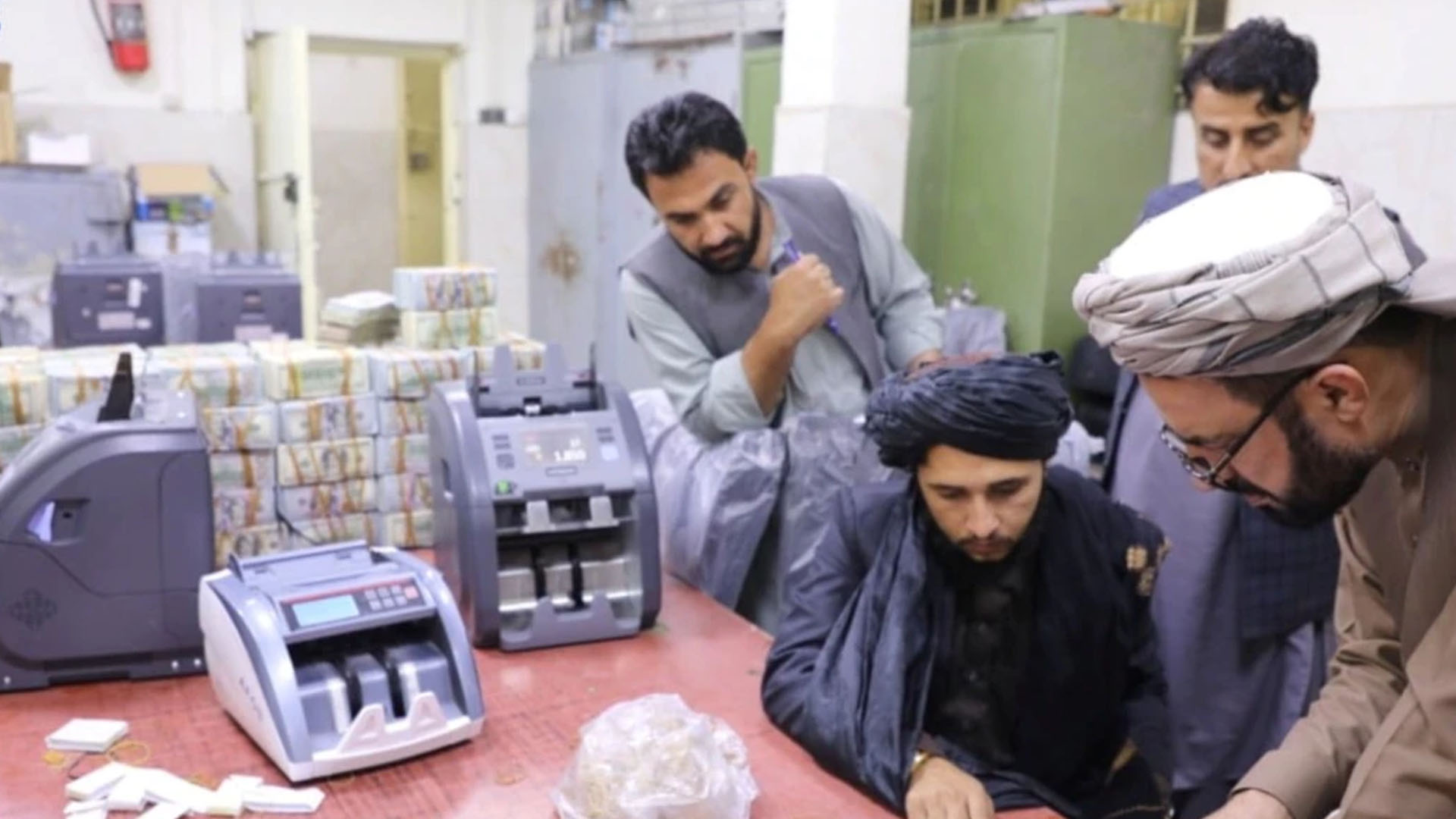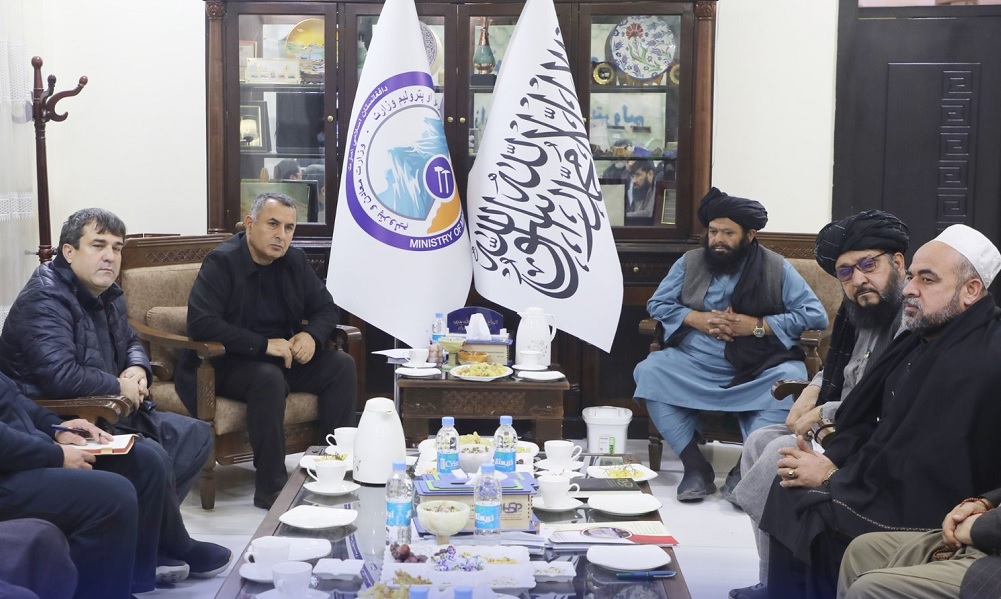Business
IEA won’t be allowed access to Afghan central bank reserves: US

Deputy U.S. Treasury Secretary Wally Adeyemo on Tuesday said he sees no situation where the Islamic Emirate of Afghanistan (IEA) who regained power in Afghanistan in August, would be allowed access to Afghan central bank reserves, which are largely held in the United States.
The IEA have called for the United States to lift a block on more than $9 billion of Afghan central bank reserves held outside the country as the government struggles to contain a deepening economic crisis.
“We believe that it’s essential that we maintain our sanctions against the Taliban (IEA) but at the same time find ways for legitimate humanitarian assistance to get to the Afghan people. That’s exactly what we’re doing,” Adeyemo told the Senate Banking Committee.
The IEA took back power in Afghanistan in August after the United States pulled out its troops, almost 20 years after the IEA were ousted by U.S.-led forces following the Sept. 11, 2001, attacks on the United States.
Washington and other Western countries are grappling with difficult choices as a severe humanitarian crisis looms large in Afghanistan. They are trying to work out how to engage with the IEA without granting them the legitimacy they seek, while ensuring humanitarian aid flows into the country.
“Our goal is to make sure that we are implementing our sanctions regime against the Taliban (IEA) and the Haqqani network, but at the same time allowing for the permissible flow of humanitarian assistance into the country,” Adeyemo said.
The Haqqani network is a group affiliated with the IEA based near the border with Pakistan and blamed for some of the worst suicide attacks of the war.
Adeyemo said the Treasury was taking every step it could within its sanctions regime to make clear to humanitarian groups that Washington wants to facilitate the flow of aid to the Afghan people, but warned that for humanitarian assistance to flow, the IEA have to allow it to happen within the country.
The Treasury last month further paved the way for aid to flow to Afghanistan despite U.S. sanctions on the IEA when it issued two general licenses.
Business
Tajik investors express interest in cement production in Afghanistan

A delegation of Tajikistani investors has expressed interest in establishing a cement production factory in Afghanistan, signaling renewed economic engagement between the two neighbors after four years of limited activity.
The delegation met with Hedayatullah Badri, Afghanistan’s Minister of Mines and Petroleum, to discuss potential investment opportunities in the country’s mining and industrial sectors. Officials said the visit reflects Tajikistan’s increasing willingness to expand economic cooperation with Afghanistan.
During the meeting, the Tajik investors praised the Islamic Emirate for what they described as improved security and a more conducive investment environment across Afghanistan.
Minister Badri welcomed the investors’ proposal and assured them of the government’s full support, emphasizing that Afghanistan is ready to facilitate investment through streamlined procedures and favorable conditions.
Representatives of Afghanistan’s private sector also view the development as a positive step toward strengthening bilateral economic ties.
Abdul Jabbar Safi, head of the Afghanistan Industries Association, said:
“After four years, Tajikistan is looking to take part in Afghanistan’s economic sector. This is encouraging news for the governments and the people of both countries.”
Economic experts believe that deeper economic engagement between Afghanistan and Tajikistan could unlock significant mutual benefits.
Nazir Ahmad Khalil, an economic analyst, said: “Tajikistan and Afghanistan share language, culture and geography. Expanding trade and investment between the two countries can meaningfully improve their economic situations. Building trust will be essential for long-term cooperation, and such investment can play a major role in poverty reduction and confidence-building.”
This new chapter of economic cooperation between Afghanistan and Tajikistan comes at a time when, since the return of the Islamic Emirate to power, several major projects have been launched between Afghanistan and Central Asian states.
The leadership of the Islamic Emirate has repeatedly emphasized that it seeks to strengthen economic relations with neighboring countries, the region, and the wider world on the basis of mutual respect.
Business
Trade bodies warn almost 11,000 Afghan transit containers stuck at Karachi port
SCCI officials urged authorities to separate trade from political tensions and immediately launch dialogue to restore commercial traffic between the two countries.

Trade bodies report that nearly 11,000 Afghan transit trade containers are stranded at Karachi port, while thousands more— including shipments of perishable goods—remain stuck at the Ghulam Khan, Spin Boldak, Kharlachi, and Torkham crossings between Afghanistan and Pakistan.
Traders involved in Pakistan–Afghanistan bilateral and transit commerce say they have suffered billions of Pakistani rupees in losses as the prolonged border shutdown continues to stall the movement of goods. Perishable food items have already begun to spoil, compounding financial losses.
They also report a sharp drop in bilateral trade volumes. Exporters who were already issued Form-E certificates have been unable to dispatch consignments, with the closure now nearing two months.
Sarhad Chamber of Commerce and Industry (SCCI) President Junaid Altaf said trade—already limited—has deteriorated further due to the closure of crossings. He estimated losses of roughly $45 million since the Torkham closure began, adding that the halt is damaging for both economies and directly affecting families whose livelihoods depend on trade.
SCCI officials urged authorities to separate trade from political tensions and immediately launch dialogue to restore commercial traffic between the two countries.
In recent weeks, repeated closures of the Pakistan–Afghanistan crossing have also brought pharmaceutical exports to a halt, putting nearly $200 million worth of medicines at risk. Hundreds of trucks carrying antibiotics, insulin, vaccines, and cardiovascular drugs remain stuck at Torkham and Chaman, with temperature-sensitive supplies facing potential spoilage.
The Pakistan Pharmaceutical Manufacturers Association (PPMA) warned that the disruption extends far beyond Afghanistan’s medicine supply. Afghanistan is Pakistan’s main overland route to Uzbekistan, Tajikistan, Turkmenistan, and Kazakhstan, and ongoing shutdowns are undermining key regional connectivity projects, including the Pakistan–Uzbekistan–Afghanistan railway.
Stakeholders are calling for urgent steps to reopen the crossings, warning that prolonged closures threaten not only pharmaceutical exports but Pakistan’s broader economic engagement across the region.
Business
Pakistan’s citrus export crisis deepens amid ongoing Afghanistan trade route closure
Afghanistan, which absorbs around 60% of Pakistan’s citrus exports, has remained closed to trade since mid-October.

Pakistan’s citrus sector is facing a worsening export crisis as the closure of the Afghanistan crossing continues to block access to its largest market.
Despite the start of the 2025 citrus season, exports are set to fall further from an already steep decline — dropping from $211 million in fiscal year 2021 to just $92.5 million in fiscal year 2025.
Afghanistan, which absorbs around 60% of Pakistan’s citrus exports, has remained closed to trade since mid-October.
This year alone, Pakistan shipped 153,683 tonnes of citrus to Afghanistan, while exports through the Afghan transit route also supply Russia, Kazakhstan, and Uzbekistan. With that corridor shut, exporters warn that the bulk of Pakistan’s kinnow harvest could go unsold.
A temporary policy exemption now allows citrus shipments to transit through Iran, but exporters say volumes to Central Asia and Russia cannot compensate for the loss of the Afghan market.
The crisis, however, goes deeper than the current crossing closure situation. Pakistan’s citrus industry continues to suffer from long-standing structural challenges — including reliance on the outdated, seeded kinnow variety that makes up over 90% of exports.
Climate change, rising pest pressure, shrinking yields, and declining A-grade fruit quality have all eroded competitiveness. Yields have fallen to about six tonnes per acre, and nearly half of kinnow processing units have closed.
Global competitors such as Egypt, China, Spain, Morocco, and Brazil have overtaken Pakistan by introducing new seedless, high-yielding varieties with longer harvest windows. As profits shrink, farmers are abandoning citrus orchards: the cultivated area has dropped 16% in the past five years.
Experts say Pakistan must urgently invest in developing seedless, climate-resilient varieties and strengthen existing research centres. At the same time, trade officials need to diversify export destinations by securing new sanitary and phytosanitary agreements to reduce dependence on a single market.
Without structural reforms and diversified access, Pakistan’s signature fruit risks losing its place in global markets — and its farmers risk losing their livelihoods.
-

 Sport4 days ago
Sport4 days agoILT20: Desert Vipers edge Gulf Giants in historic super over thriller
-

 Latest News2 days ago
Latest News2 days agoMuttaqi: Afghanistan’s progress requires both religious and modern education
-

 Regional4 days ago
Regional4 days agoSix Pakistani soldiers killed in TTP attack in Kurram District
-

 Business4 days ago
Business4 days agoTrade bodies warn almost 11,000 Afghan transit containers stuck at Karachi port
-

 World4 days ago
World4 days agoPowerful 7.6 earthquake hits northern Japan, tsunami warnings issued
-

 Latest News3 days ago
Latest News3 days agoTrump calls Afghanistan a ‘hellhole’ country as US expands immigration restrictions
-

 Sport5 days ago
Sport5 days agoSorkh Poshan Khafi defeats Sarsabz Yashlar 4-0 in Afghanistan Champions League
-

 Sport3 days ago
Sport3 days agoCommanding wins for Arman FC and Sarsabz Yashlar in Afghanistan Champions League
























